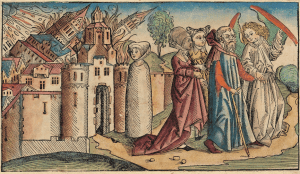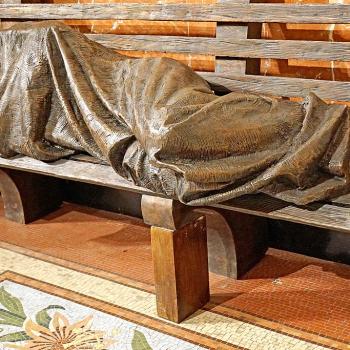 The city of Sodom was a city of extreme selfishness and luxury. The people who lived there built a wall around the city to keep outsiders out so they can preserve the wealth they built up on the backs of others for themselves. While some aliens, like Lot and his family, could live side by side with the Sodomites, they were ill treated and disrespected, as the people of Sodom did not want to share their material goods with anyone. They were prideful of their supposed greatness. Lacking all charity, they cut themselves off from the mercy and grace they needed to truly prosper. The sin of the city of Sodom lay in their haughty nature, where they felt they had a right to do whatever they wanted with their own goods, without regard to the harm they do to others, as the prophet Ezekiel indicated:
The city of Sodom was a city of extreme selfishness and luxury. The people who lived there built a wall around the city to keep outsiders out so they can preserve the wealth they built up on the backs of others for themselves. While some aliens, like Lot and his family, could live side by side with the Sodomites, they were ill treated and disrespected, as the people of Sodom did not want to share their material goods with anyone. They were prideful of their supposed greatness. Lacking all charity, they cut themselves off from the mercy and grace they needed to truly prosper. The sin of the city of Sodom lay in their haughty nature, where they felt they had a right to do whatever they wanted with their own goods, without regard to the harm they do to others, as the prophet Ezekiel indicated:
Behold, this was the guilt of your sister Sodom: she and her daughters had pride, surfeit of food, and prosperous ease, but did not aid the poor and needy. They were haughty, and did abominable things before me; therefore I removed them, when I saw it (Ezek. 16:49-50 RSV).
The poor and needy were kept outside; the gates to the city were kept closed. Only those who showed some sort of promise, some greatness, some ability to add to the riches of the city like Lot, were reluctantly let in and allowed a place in the midst of their prosperity. Sodom constantly looked down upon the outsider, the stranger, the foreigner wanting to enter their city. Foreigners were not welcome, even for just one day. Their abominable practices came forth out of their pride, out of their inordinate pursuit for pleasure, which they thought was theirs by right because of their supposed greatness. They thought that all others could and should stay away, or else suffer the consequences for unlawfully invading the city.
Jesus explained that in the day of Lot, the people of Sodom continued to live their life as normal, enjoying the pleasures of wealth until the very end:
Likewise as it was in the days of Lot — they ate, they drank, they bought, they sold, they planted, they built, but on the day when Lot went out from Sodom fire and sulphur rained from heaven and destroyed them all — so will it be on the day when the Son of man is revealed (Lk. 17:28-30 RSV).
Wherever we find great pride mixed with avarice and hedonism, we will find great injustices which will tear apart and destroy those possessed by such pride. Those who promote themselves to be great due to material wealth and luxury will find that all they have will come crashing down. They will suffer, and suffer terribly, for the evil which they have done. Sodomites the world over seek to make themselves great at the expense of others; Sodomites the world over will find that their abominable haughtiness will be the foundation for their own destruction as they come face to face with the consequences of their actions. Those who build their greatness upon ignoble ideologies will find that all the scaffolding they have established to make themselves look great only hide the fact that they are anything but great. Their greatness is a farce, and from that farce, tragedy is bound to follow.
The example of Lot shows us that someone can live in the midst of such evil, combat it, and therefore escape the consequences of that evil if they are prudent. Lot, like Abraham, continued to show hospitality to others. This countered the haughty inhospitality of the people of Sodom. St. John Chrysostom saw this is what connected Abraham with Lot; Abraham was, to be sure, superior to Lot, but Lot followed the example of Abraham, willingly to welcome strangers and give them shelter:
You see, just as the patriarch [Abraham] was seated at the hour of midday, when he observed the visitors and set about snaring them by running to meet them and welcoming the travelers with joy, in just the same way this good man [Lot], too, though aware of the evil behavior of the inhabitants of Sodom, did not excuse himself from the task of remaining in wait even at evening time but remained at his post till then in case some treasure should come his way and he might be in a position to reap the fruit of hospitality.[1]
Lot stood watch at the city gate. The people of Sodom wanted to keep strangers out. Lot looked for and welcomed them. He did not just wait for strangers, because if he did, he would not have met with them and shown his charity: he went outside of the city, stood watched, and waited long hours, looking for whoever would come by, so he could share with them his prosperity, welcoming the unwelcome strangers into the city. This, exactly, is what Origen said of Lot: he was anxious to meet with strangers and give them aid:
For in saying that hospitality is to be pursued, he is showing not only that we should receive the stranger who comes to us, but also that we should inquire after, and be anxiously concerned about, and pursue, and make a diligent search for strangers, wherever they may be, lest perchance they may be sitting in the street or lying somewhere without a roof over their heads. Call to mind Lot, and you will discover that it was not the strangers who sought for him, but he who looked for strangers; and this was pursuing hospitality.[2]
This, then, is how the author of Genesis explained Lot’s meeting with the two messengers of God:
The two angels came to Sodom in the evening; and Lot was sitting in the gate of Sodom. When Lot saw them, he rose to meet them, and bowed himself with his face to the earth, and said, “My lords, turn aside, I pray you, to your servant’s house and spend the night, and wash your feet; then you may rise up early and go on your way.” They said, “No; we will spend the night in the street.” But he urged them strongly; so they turned aside to him and entered his house; and he made them a feast, and baked unleavened bread, and they ate (Gen. 19:1-3 RSV).
The people of Sodom were infuriated. As St. John Chrysostom indicated, Lot was a resident alien who let in other aliens. The land was for the Sodomites, and the gate was meant to keep strangers out, to keep out all those lowlifes who would be seen as takers who gave nothing back to the city:
“Get out of the way,” they said. “You came here to dwell as an alien; surely you’re not making the decisions? All right, now we’ll treat you worse than them.” See how, whereas the just man spoke with restraint to them, they indulged in extreme audacity by contrast. [3]
Extreme audacity, extreme haughtiness, extreme pride, and extreme inhospitality go side by side. There is no true greatness found with any of these, though all of them can be and will be used by those who like to show themselves off, praising themselves with blaring trumpets in front of others.
It is this extreme audacity of the Sodomites which we see today coming from the United States. American Sodomites look down upon foreigners. With the president, Trump, they want to set up a wall with a gate, just like the one set around Sodom, to keep needy people out. When people come to the United States, seeking sanctuary, seeking basic human decency, instead of hospitality they find themselves not only turned away but abused just like the Sodomites in Sodom wanted to do with Lot’s guests. The kind of abuse might differ: instead of sexually assaulting such travelers (though that is happening as well to the migrants who try to enter the United States), Trump with his supporters cast them aside with tear gas, thinking there is no problem with such inhumane action. They continue to live after and follow the ways of Sodom. They think themselves great, and no stranger is welcome. They have taken in all the wealth for themselves: who are they to care for the suffering of others, especially the suffering they have made happen? They are setting up their own demise. But we do not need to share their fate. We have the example of Lot:
“Now, seeing them,” the text goes on, “Lot rose to meet them.” Let this be heeded by those who are given to repulsing people who call on them with requests to make and causes to plead, and who show them great inhumanity. I mean, see how this good man did not wait till the visitors reached him but like the patriarch, without knowing who the visitors were but presuming that they were travelers of some kind, well nigh jumped for joy on seeing them, as though falling upon his prey and not missing the object of his desire.[4]
We must reach out and help those seeking shelter. We must welcome the stranger, going to the gates, going to the border, and beyond if we can, to help them come in and find the hospitality which they deserve. If enough of us do this, we might not go down in flames.
[IMG=Lot Leaving Sodom. From the Nuremberg Chronicle. Scan by Michel Wolgemut, Wilhelm Pleydenwurff (Text: Hartmann Schedel) [Public domain], via Wikimedia Commons]
[1] St. John Chrysostom, Homilies on Genesis 18-45. Trans. Robert C. Hill (Washington, DC: CUA Press, 1990), 437.
[2] Origen, Commentary on the Epistle to the Romans. Books 6- 10. Trans. Thomas P. Scheck (Washington, DC: CUA Press, 2002), 214-15.
[3] St. John Chrysostom, Homilies on Genesis 18-45, 447.
[4] St. John Chrysostom, Homilies on Genesis 18-45, 440.
Stay in touch! Like A Little Bit of Nothing on Facebook













